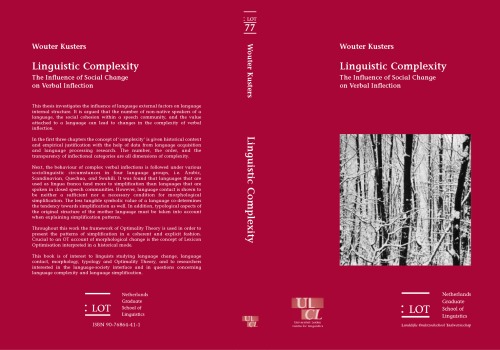

Most ebook files are in PDF format, so you can easily read them using various software such as Foxit Reader or directly on the Google Chrome browser.
Some ebook files are released by publishers in other formats such as .awz, .mobi, .epub, .fb2, etc. You may need to install specific software to read these formats on mobile/PC, such as Calibre.
Please read the tutorial at this link: https://ebookbell.com/faq
We offer FREE conversion to the popular formats you request; however, this may take some time. Therefore, right after payment, please email us, and we will try to provide the service as quickly as possible.
For some exceptional file formats or broken links (if any), please refrain from opening any disputes. Instead, email us first, and we will try to assist within a maximum of 6 hours.
EbookBell Team

4.0
36 reviews 
ISBN 10: 9076864411
ISBN 13: 9789076864419
Author: Wouter Kusters
This thesis investigates the influence of language external factors on language internal structure. It is argued that the number of non-native speakers of a language, the social cohesion within a speech community, and the value attached to a language can lead to changes in the complexity of verbal inflection.
In the first three chapters the concept of ‘complexity’ is given historical context and empirical justification with the help of data from language acquisition and language processing research. The number, the order, and the transparency of inflectional categories are all dimensions of complexity.
Next, the behaviour of complex verbal inflections is followed under various sociolinguistic circumstances in four language groups, i.e. Arabic, Scandinavian, Quechua, and Swahili. It was found that languages that are used as lingua franca tend more to simplification than languages that are spoken in closed speech communities. However, language contact is shown to be neither a sufficient nor a necessary condition for morphological simplification. The less tangible symbolic value of a language co-determines the tendency towards simplification as well. In addition, typological aspects of the original structure of the mother language must be taken into account when explaining simplification patterns.
Throughout this work the framework of Optimality Theory is used in order to present the patterns of simplification in a coherent and explicit fashion. Crucial to an OT account of morphological change is the concept of Lexicon Optimisation interpreted in a historical mode.
This book is of interest to linguists studying language change, language contact, morphology, typology and Optimality Theory, and to researchers interested in the language-society interface and in questions concerning language complexity and language simplification.
1. INTRODUCTION
2. COMPLEXITY IN VERBAL INFLECTION
3. OPTIMALITY THEORY.
4. ARABIC.
5. SCANDINAVIAN.
6. QUECHUA.
7. SWAHILI
8. CONCLUSION
linguistic complexity the influence of social change
linguistic complexity the influence of social change on verbal inflection
linguistic complexity definition
language is constantly evolving in response to social change
linguistic influence psychology
linguistic influence
linguistic complexity meaning
Tags: Wouter Kusters, Linguistic, Complexity, Influence, Social, Change, Verbal, Inflection